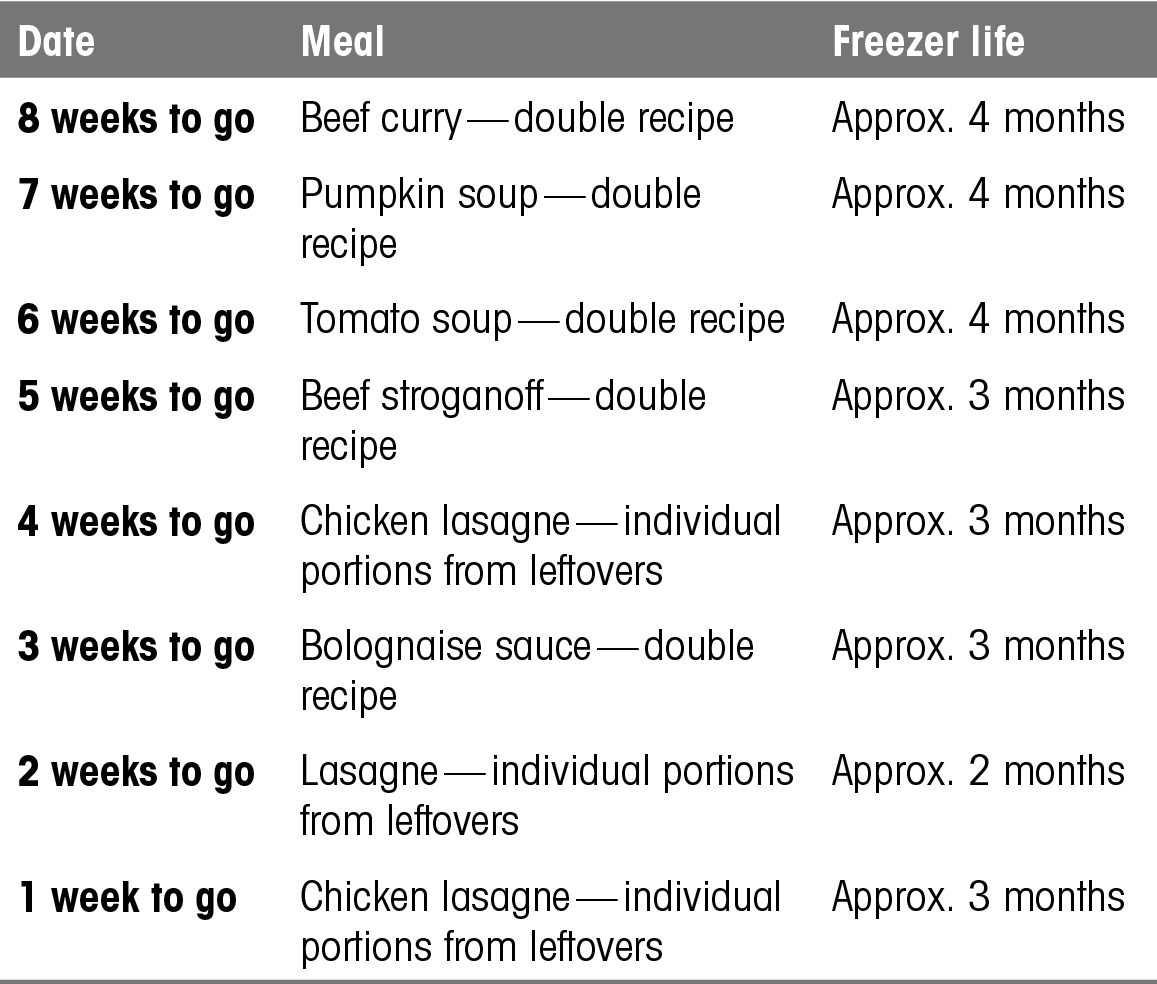Preparing food
Serving up a
nutritious family meal on time can be difficult when you have a newborn.
Including meal preparation as part of my routine in the lead-up to the
birth of each baby made this task easier.
Cooking in bulk
Most pregnancy books
tell you to cook some meals in advance and have them in the freezer for
when baby is born. It sounds easy, but in reality, towards the end of a
pregnancy tiredness can hit, and even serving up an evening meal for the
family can be a challenge in itself. Preparing a simple, bulk-cooking
schedule can really help make this task doable. It makes it part of your
daily routine rather than a separate task that has to be added to the
‘to do’ list.
For some meals —
such as lasagne — you’ll have leftovers even when you cook the standard
quantity. Instead of eating the leftovers for lunch or another meal,
begin freezing these portions over a couple of months and you’ll soon
have enough in the freezer for extra meals. Other meals — such as
pumpkin soup and spaghetti bolognaise — are easy to cook in double
quantities so you can freeze one full serve. Try following these steps
to help get you started on building your freezer supplies.
• Find out which meals your family likes that freeze well.
• Work out the
freezer life of these meals (for example, beef stroganoff will last for
about three months and lasagne about two months).
• Schedule preparing and freezing these meals into your menu plans in the months leading up to the birth of your baby.
• Either freeze them as a family-sized meal or in individual adult or child portions.
The
pre-baby, bulk-cooking plan shown in table 1 is an example of a
cooking schedule that would provide you with a combination of full-sized
family meals and leftover portions in your freezer. Each of these meals
can be added to the weekly menu plan for that week so that the extra
cooking fits easily into that part of your day.
Table 1: pre-baby bulk-cooking plan

Menu planning in advance
Unless
you have an amazingly large freezer that you can stockpile with tons of
prepared meals, the reality is that you’ll still have to cook meals
most days of the week when you
have a newborn. If you’re not into regular menu planning yet, a couple of
weeks before your due date take the time to prepare a month of menu
plans. The meals don’t have to be assigned to any permanent dates, but
you can plan them for a four-week period so that you’ll have a weekly
menu plan for you and others to follow and a grocery shopping list for
each week that anyone can shop from. This will help you through the
mealtime workload, whenever your beautiful baby decides to arrive.
Menu
plans can really help with sharing the workload when baby needs your
attention the most. My husband is a pretty good shopper if he has a
list. When our last baby was born, we had six weeks of menu plans and
associated shopping lists hanging on a clip on the fridge. He went to
the market each weekend to buy the fresh fruit and vegetables using
these lists and made a trip to the supermarket once a fortnight. It was
fabulous not to have to think about the planning and shopping for meals
for a few weeks knowing that we had everything we needed.
Stocking up on essentials
When
you have more than one child, it’s hard to have a set routine for a new
baby. They’re frequently lugged in and out of the car during the
run-around that takes place due to their siblings’ requirements. Prior
to my due date for the last two babies I stocked up on necessary items
for the house that I knew would eventually be used or consumed. This
helped cut out trips to the shops with a newborn, meaning baby’s routine
was less interrupted and I wasn’t so busy. I had a checklist that
ensured the following household areas were well stocked:
• pantry
• fridge
• freezer
• medicine cabinet
• toiletries
• kids’ socks
• cleaning products
• laundry products.
Preparing for celebrations
Two
of our babies were born close to Christmas. I made sure I had all the
Christmas shopping done a couple of weeks before my due date. I’m not a
fan of shopping in crowds anytime, especially not when I have a newborn
baby. I take a similar approach with birthday presents: I write up a
list of upcoming birthdays for the three months following baby’s arrival
and determine the presents I need to buy. I then purchase them (and the
cards) so they’re ready in time for each birthday.
Preparing baby’s clothes
I boxed up baby
clothes as each baby outgrew theirs: a boys’ box, a girls’ box and a
‘neutral’ box. We chose not to find out the sex of our babies, which
meant organising baby clothes required a bit of preparation. Before each
baby was born I would wash all the baby clothes, placing the neutral
clothes in baby’s drawers (and some in the hospital bag). Then we’d wait
to see what other clothes we’d need.